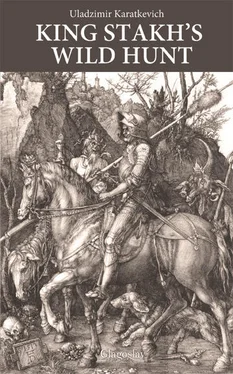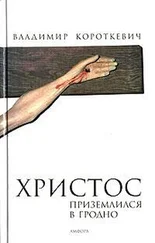“It's dangerous alone,” Ryhor lowered his eyes.
“But you, too, will be alone.”
“Me? No! I'm nobody's fool. I'm bold, but not so bold as to fight one against twenty.”
“But I tell you,” I said stubbornly, “that the mistress of Marsh Firs will not live through another appearance of the Wild Hunt at the walls of her house. I must not allow them to enter the park if they intend to come.”
“Today I cannot help you,” said Śvieciłovič sunk in a brown study. “What I must clear up is more important. Perhaps the Wild Hunt won't come today at all. An obstacle will stand in its way.”
“Well then,” I, rather dryly, interrupted him. “You should have expressed your views and not given us puzzles to answer. I'll go out alone today. They aren't expecting anybody, and on that I am laying my hopes. By the way, they don't know that I have a gun. Twice I met with the Hunt, and also with that man who shot me in the back, and I never used it. Well then, they will see yet... How slowly we are untying this knot! How lazily our brains are working!”
“Everything is cleared up easily and logically only in bad novels,” Śvieciłovič growled, offended. “In addition, we are not detectives from the provincial police. And thank the Lord for that!”
Frowning, Ryhor was digging the earth with a twig. “Enough!” he said with a sigh. “We must act. I'll make them hop about yet, the skunks! And, excuse me, after all you are aristocrats, gentlemen all. We are together now, following the same path, but if we find them, we mužyks shall not only kill these savage creatures, we will burn their nests, we will bring utter ruin on their offspring, and we'll perhaps put an end to their descendants.”
Śvieciłovič began to laugh:
“Biełarecki and I are very fi-ine gentlemen! As the saying has it: a gentleman all dressed up in a caftan made of grape vine, and sandals made of bast. Actually, we ought to annihilate them all and their like including their young ones, for with the passing of time, these young ones will grow up to be aristocrats.”
“If only it is not a phantom, this Wild Hunt, a vision seen in a dream when asleep. Well, there wasn't, there has never yet been a person who was able to hide his tracks from me, the best of hunters. But phantoms will be phantoms.”
We took our leave of Ryhor. I, too, agreed partially with his last words. There was something supernatural about this Hunt. This cry that turned one's heart to ice — it couldn't come from a human chest. The thundering hoofs heard from time to time. The drygants a breed already extinct, and even if they can still be found, who in such a remote corner as ours, is wealthy enough to have been able to buy these horses? Somehow this must be connected with King Stach's Wild Hunt. Who is this Lady-in-Blue whose ghost disappeared in the night, if her twin (a twin entirely unlike her) is peacefully sleeping in her room? To whom does this awful face belong, the face that looked at me through the window? My head was splitting. Yes, there was something unnatural going on here, something criminal and frightening, a kind of mixture of devilry and reality.
I looked at Śvieciłovič, walking at my side, merry and playful, as if these questions didn't exist as far as he was concerned. The morning was indeed a beautiful one: although the weather was cloudy and dull, the sun was not far away, and each little yellow leaf on the trees thrilled, and it even seemed that they were turning towards the dew in the warm autumn sun.
Through the glade we saw a level plain far ahead, and farther on — the boundless brown bog and the heather waste land. Marsh Firs was far behind them. And in all this there was a kind of sad, incomprehensible beauty, a beauty that made the heart in every son of these depressing places beat both painfully and sweetly.
“Look, a little aspen tree has run out into the field. It has become shy and begun to blush, reddening all over, poor thing,” Śvieciłovič said, deeply moved.
Moving forward, he stood at the precipice. His ascetic mouth softened, a timid, wandering smile appeared on his face. His eyes looked into the distance, and he himself, his entire body, seemed to have become weightless, impetuous, ready to soar upward above our dear, poor earth.
“This is how such as he ascend the cross,” I again thought. “A beautiful head under the filthy, rotten axe...”
And really, one sensed a kind of thirst for life and a readiness for self-sacrifice in this beautiful face, in these “lilywhite” hands, as our ancestor-poets would have put it, in the fine, slender neck, in the steady brown eyes with their long lashes, but with a metallic lustre in their depths.
“Ah, my land!” he sighed. “My dear, my only one! How cold your attitude towards the little aspens that run out into the field ahead of all the others, and into the light. They are the first to be broken by the wind. Don't be in such a hurry, you little fool... But it cannot help itself. It must.”
I put my hand on his shoulder, but I quickly removed it. I understood that he was not at all like me, that now he was soaring above the earth, that he was not here. He was not even ashamed of using high-faluting words which men usually avoid.
“Do you remember, Biełarecki, your preface to ‘Belarusian Songs, Ballads and Legends?’ I remember: ‘My Belarusian heart became embittered when I saw that our best, our golden words and deeds had fallen into oblivion.’ Wonderful words! For these words alone your sins will be forgiven you. So what then is there to be said, when not only my Belarusian, but my human heart, aches at the thought of our neglect and the human suffering, the useless tears of our unfortunate mothers. It is impossible, impossible to live like this, my dear Biełarecki. It is in man's nature to be kind, but he is turned into an animal. Nobody, nobody, wishes to let him be a human being. Simply to cry: ‘People, embrace one another!’ is, evidently, not enough. And there are people here who keep going to the rack. Not for the sake of glory, but for conscience' sake, to kill the torments of conscience — as a man does when he goes into a dense forest, although he doesn't know the way, to save a friend, because he knows that it is shameful, shameful to stop, to stand still. So they go on, stray, and perish.
They know only that a person mustn't be like that, that it is no good promising him pie in the sky, that he needs to have happiness under these ceilings so covered with smoke. And they are more courageous than Christ: they know that there is no resurrection after the crucifixion. Only crows will fly over them and women will bewail them. And chiefly, their saintly mothers.”
At this moment he seemed superhuman to me, so fine, so worthy, that I felt terrified and foresaw his death through the veiled future. Such as he do not live. Where will it be? On the rack in a torture-chamber? On the scaffold facing the people? In a hopeless battle of insurgents against the army? At a writing-desk hurriedly writing down his last fiery thoughts, breathing his last breath? In a prison corridor, shot in the back, not daring to look him in the eyes?
His eyes were shining.
"Kalinoŭski went to the gallows. Piaroŭskaja, a woman you would be willing to die for her on the scaffold... Such beauty — with a dirty rope round her neck. You know, Janoŭskaja resembles her somewhat. That's why I idolize her, although that's not quite exactly so. But she was an aristocrat. That means there is a way out for some of our people, too. Only you must follow their path, if you do not want to rot alive... They strangled her. You think all can be strangled? Our strength is growing. If I could hang with them, even by a rib from the hook, to prevent King Stach's Wild Hunt tearing across the land at a mad pace, to stop the horrors of the past, its apocalypse, death. I'll leave as soon as I finish with this. I can't stay here. You know what friends I have, what we have in mind to do? They shall tremble, those fat ones, they shall! We haven't all been strangled to death. This means a great fire. And the years, the years ahead! How much suffering, how much happiness! What a golden, magic expanse is ahead! What a future awaits us!”
Читать дальше



